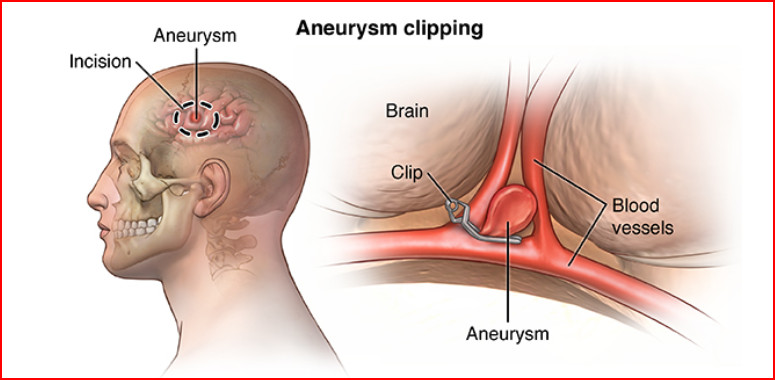Aneurysm is ballooning out of the thinned vessel wall can lead to dangerous complications if ruptures. Once brain aneurysm is diagnosed by neuro imaging DSA or CT angiogram, after discussing about approach risks and benefits of clipping of aneurysm.
Also also known as disc herniation, disc prolapse, disc extrusion, disc migration, disc protrusion.
The vertebrae (bones) that make up your spinal column are piled on top of each other. From top to bottom, the cervical spine has seven bones, the thoracic spine has twelve and the lumbar spine has five, with the sacrum and coccyx at the bottom. Discs provide cushioning for these bones. The discs cushion the bones by absorbing shocks from everyday actions such as walking and lifting.
A soft, gelatinous interior region and a strong outside ring make up each disc. The inner section of the disc might protrude through the outer ring due to injury or weakening. A slipped, herniated or prolapsed disc is the medical term for this condition. This creates discomfort and anguish. You may suffer numbness and pain along the afflicted nerve if a slipped disc compresses one of your spinal nerves.
Symptoms of a slipped disc:
A slipped disc can occur anywhere in your spine. In your spine, from your neck to your lower back. Slipped discs are most commonly found in the lower back and in neck. It is also known as PIVD(Prolapsed intervertebral disc). A slipped disc can put additional strain on the nerves and muscles in the area.
The symptoms are as follows:
- back pain and neck pain .
- Standing or sitting causes pain that gets worse.
- Short distance walking causes pain.
- Discomfort and numbness on one side of the body.
- Pain that radiating/extends to your arms or legs
- Pain that gets worse at night or specific motions.
- Standing or sitting causes pain that gets worse.
- Short distance walking causes pain.
- Muscle weakness that is not explained.
- Sensations of tingling, aching or burning in the afflicted area.
- Difficulty in controlling bladder or bowel movements.
The sorts of pain differ from one person to the next. If your discomfort causes numbness or tingling that interferes with your ability to control your muscles, consult your doctor or if you are from Bangalore then visit a Bangalore Spine Specialist Clinic.
What causes slipped disc?
The outer ring of a slipped disc(annulus) becomes weak or damaged, allowing the inner section(nucleus pulposus) to slip out. This is something that can happen as you become older. A slipped disc might also be caused by certain abnormal movements. When twisting or turning to lift an heavy object, a disc can slip out of its place. Lifting a huge, heavy object suddenly puts a lot of strain on the lower back, which can lead to a slipped disc. Because discs must support the extra weight, obese people are more likely to develop a slipped disc.
A slipped disc can also be caused by weak muscles and a sedentary lifestyle. You are more likely to get a slipped disc as you get older. This is because as you become older, your discs lose some of their protecting water content. As a result, they are more likely to fall out of place.
How are slipped discs diagnosed?
A physical examination will be performed first by your doctor- neurosurgeon. They will be on the lookout for the source of your suffering. This will entail assessing your nerve function and muscle strength as well as determining whether or not you experience discomfort when moving or touching the affected area. Your doctor will also inquire about your medical history as well as your current symptoms. They will know when you first started experiencing symptoms and what activities you were doing at that time.
Imaging tests can let your doctor see your spine’s bones and muscles as well as any damaged areas. Imaging scans include the following:
- X rays
- CT scans
- Magnetic Resonance Imaging (MRI) scans
Your doctor can put all of this information(clinical and radiological) together to figure out what’s causing your pain, weakness or discomfort.
Is it possible to prevent a slipped disc?
Although you may not be able to prevent a slipped disc, you can take efforts to lower your chances of acquiring one. These steps are as follows:
- Use proper lifting techniques, such as bending and lifting from your knees rather than your waist.
- Maintain a healthy body mass index (BMI).
- Do not sit for a long period of time, do some exercises as well.
- Strengthen the muscles in your back, legs and belly by doing workouts.
- Balanced diet.
- To seek help of a doctor at right time.
Summary:
The great majority of disc issues resolve without the need for surgery. Most people can return to normal function in a short period. In Neuro Wellness Care Services a Bangalore Spine Specialist Clinic, you will get the best treatment for problems related to spine by dedicated Spine Surgeons in Bangalore and the best Back Pain Treatment in Bangalore as well.




